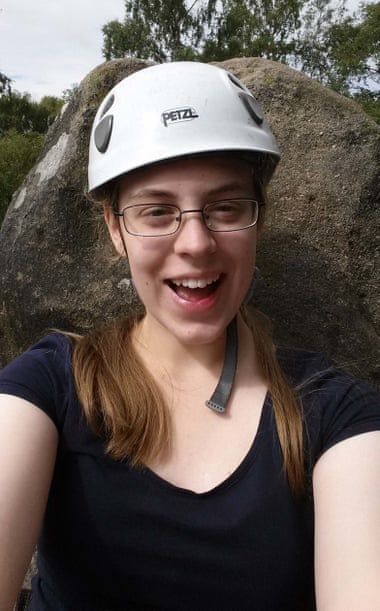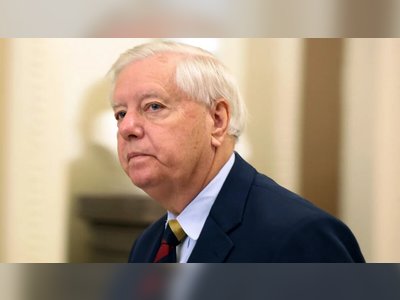
‘When you stop fighting, that’s when you start grieving’: the parents battling to prevent student suicide
Days after their daughter died in April 2018, Robert and Margaret Abrahart turned detective. “It’s a survival mechanism – we will be matter of fact, we will organise,” says Robert. “It seems the only way to cope.” The day after they were told Natasha, a student at the University of Bristol, had killed herself, they went to identify her body, then clear out her flat. That was where they found an envelope Natasha had kept containing all her online passwords. Back at home in Nottingham, they logged on to her university email account and found their daughter had told at least one member of staff she had been feeling suicidal.
In the four years since, they have sought answers, culminating in a civil action against the University of Bristol, which was heard over several days last month. A judgment is still to come as to whether the university breached its legal duties to Natasha and, if so, whether this contributed to her death (requiring it to award compensation). It has been a long, expensive process – the couple crowdfunded and cashed in their pensions to pay for it – but even a successful outcome won’t feel like a victory, Margaret says, unless it starts a wider understanding of student suicide, and meaningful change across all universities. “We want universities to say, if this happened to Natasha, could it happen to anybody else? What do we need to stop it?”
Natasha’s death was one of 11 suicides, or suspected suicides, at Bristol between 2016 and 2018. In 2018, the university’s vice-chancellor, Prof Hugh Brady, said: “To have a student death from any cause is a real tragedy, to have a number in quick succession really tears at the very heart of our institution and our mantra now is: mental health is everybody’s business at our university.”
Natasha, 20, was extremely intelligent, loved maths and physics, and was a high-achieving student. She was close to her younger brother, had a group of friends she had known for a long time, and a boyfriend. Since childhood, she had also shown signs of social anxiety disorder: she wouldn’t talk in class, was wary of new people and even supposedly simple things, such as talking to staff in shops, she would leave to her friends. At university, her parents have since found out, Natasha would send other people to the bar to order her drinks for her.
Her parents weren’t worried about her going to university because she was so self-reliant and independent. “What I hadn’t seen was that her strengths were actually connected with her social anxiety,” says Margaret, “because it meant that she didn’t have to talk to other people.”
Natasha killed herself on the day she was due to give a presentation as part of her physics degree. She had found the oral assessment just about impossible, running out of one interview and missing others, which meant she was in danger of not passing the module and progressing.
At an inquest into her death in 2019, the coroner concluded that gross failings amounting to neglect by Avon and Wiltshire Mental Health Partnership Trust, where Natasha had been referred after seeing a university GP, had contributed to her suicide. The inquest and the trial heard evidence that Natasha would probably have been terrified of the presentation she was due to give to students and staff in a large lecture theatre. What the Abraharts believe the inquest did not look at in enough detail was the university’s role in their daughter’s death and why – despite Natasha’s difficulties – she was not given the support she needed.
 Natasha Abrahart in 2016.
Natasha Abrahart in 2016.
Robert points out that they have ideal backgrounds to pursue such a cause – he was a professor of geography at Nottingham University, and Margaret worked in NHS mental health services. They have an understanding of both worlds. “We’re retired,” he adds. “We can spend all day on this.”
They sued Bristol under the Equality Act, arguing that Natasha had been discriminated against because of her mental disabilities, and that the university could have made reasonable adjustments. “They knew there was a problem,” says Robert. “The staff in the school of physics felt unable to fix it until she jumped through the hoops.” Staff were aware since at least the previous October that Natasha struggled in oral assessments. One of the lecturers contacted the university’s disability services to get advice on what adjustments could be made, but didn’t hear back and didn’t follow it up. Natasha also contacted an administration manager at the department and told her in an email that she had been having suicidal thoughts; the manager accompanied her to an appointment with the university GP, but the inquest found no evidence that the administrator had informed the student wellbeing service about Natasha’s risk of suicide.
The responsibility, Robert and Margaret allege, was all placed on Natasha to contact these services and get what she needed, including filling out a form detailing her extenuating circumstances – but with the social anxiety she was experiencing, as well as depression, her parents believe this was an impossible task. “Everybody’s trying to signpost her to places to get help, but the biggest difficulty with social anxiety is talking to people and that’s exactly what they’re recommending,” says Margaret. “She couldn’t get the doctor’s letter, couldn’t do the form filling, which they claim would have enabled them to make the adjustments,” says Robert. He believes Natasha’s difficulties were obvious, and that more allowances – such as swapping the oral presentation for a written assessment – could have been easily made. “But they decided to wait to see if she would do the necessary. Six months later, she still hasn’t done that and then she’s had six months of non-attendance, bad marks, increasing depression, and then she became suicidal.”
In March 2018, Robert received a phone call from Natasha’s flatmate saying she had tried to kill herself (it later emerged this had happened some days earlier). Natasha, speaking on the phone, sounded fine, saying she felt better and wouldn’t do it again. “We wanted to pick her up straight away and she kept putting us off,” says Margaret. They made sure she made an appointment with the GP first thing the next morning. She was due to break for Easter in the coming days, but kept delaying coming home, until Margaret drove down without telling her to bring her back.
“It’s difficult to know what to do,” says Robert. “You can go down and drag her away, but she’s an adult.”
Natasha had seemed fine over the Easter holidays, if even quieter than usual, but when Margaret tried to talk to her about the suicide attempt she refused to discuss it. Natasha told her parents the university knew what was going on, but she didn’t tell them about the presentation she was worried about. Just over two weeks after Margaret drove Natasha back to Bristol, Natasha killed herself.
What the Abraharts hope to get from their court case is “greater clarity on the Equality Act, and greater clarity on duty of care,” says Robert. It’s all very well investing in more counsellors and reducing waiting time to improve student mental health, he says, but they don’t believe that would have helped Natasha, with her particular difficulties (her boyfriend told them she had been given helpline numbers; when she called, she remained silent until they hung up).
They are angry about the way, in Natasha’s case, they believe the problem was shifted to the NHS without the university reflecting on the distress they allege it was causing. “In all realms of business, people have occupational health, but we don’t seem to have that [for students],” says Margaret. “And yet everybody knows that studying is stressful. It’s about universities looking at their processes: is this safe? Is this actually the best way? Is that part of their learning? There was a school of thought that said if the students are not up to it, they shouldn’t be here.” Robert adds: “Universities aren’t an endurance test – people go there for education.”
In its formal response, the university said that academic and non-academic staff tried to engage with Abrahart over alternative assessments. But it also argued that it was not reasonable to remove the use of oral assessments because it would have “compromised” Abrahart’s education. In a statement at the end of the court case, Bristol University said that “staff in the school of physics were instrumental in helping Natasha to access appropriate professional support” and that, specifically, where the presentation was concerned, “the efforts of colleagues included offering alternative options for Natasha’s assessments to alleviate the anxiety she faced about presenting her laboratory findings to her peers. These options included not taking to the stage, letting others present, and not having to answer any subsequent questions. She was reassured that she didn’t have to go ahead and could change her mind on the day of the presentation.”
Beyond Natasha, the Abraharts now want to see increased protection for all vulnerable young adults, often living away from home for the first time. It could be ending things such as students being dismissed from their course by email. “You wouldn’t get that in employment,” says Robert. In July 2020, Mared Foulkes, a student at Cardiff University, took her own life after receiving an automated email saying she had failed her exams and would not be allowed to progress to the third year, though her exam result was later upgraded to a pass; in February this year, Cardiff apologised.
A few days after Natasha died, another student at Bristol, Ben Murray, also took his own life. He had been told by letter and email, rather than in face-to-face meetings, that he would be removed from university after missing lectures and exams. After Murray’s death, and campaigning by his family, Bristol reviewed its dismissal process and introduced a policy where students would give consent to the university to contact their parents if there were concerns about their wellbeing.
According to latest figures, 95 students died by suicide in England and Wales in the 12 months to July 2017, and the Abraharts are in touch with other families affected. Each year, says Margaret, “that’s potentially almost 100 people who may have had preventable deaths. With a lot of students, we find that they may have opted out, not fully engaged with the university over a period of time. If you can do something that catches things early on, before people make that first attempt, people are not going to get further along the line.” Without centralised monitoring, Margaret believes, it is easy for universities to view the small number of suicides at each institution as a tragic anomaly. “But if you pool all of the universities together, you can learn from each other,” she says. “And if it saves a life, it can save the distress that losing …” She pauses. “One of the things that I’ve learned is how many people are affected by suicide.” Not just Natasha’s family and friends, but the staff as well.
Despite having plenty to say about the legal proceedings, Margaret and Robert find it hard to describe the impact of their daughter’s death on themselves. “Every big life event will be noticed by the fact that Natasha is not there,” says Margaret. “We’re looking at how this could have been prevented, and somehow your mind moves out from the fact that it’s actually too late. The emotional side, we’ve shelved it; we’ve focused instead on the practical things, because it’s easier.” The four-year legal battle has become, she says, “our new job, so when this goes, it’s going to be back to when she died and having to cope with that. When you stop fighting, that’s when you start grieving. So it’s quite mixed feelings.”

